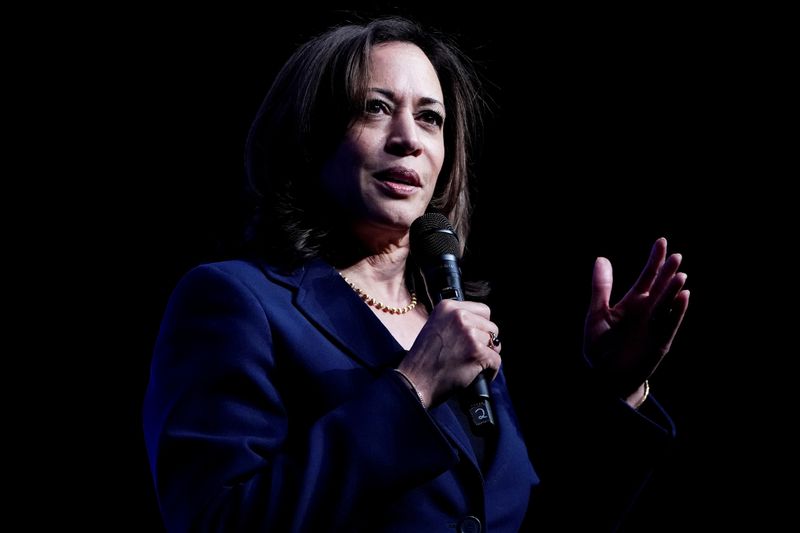By James Oliphant
WASHINGTON (Reuters) - Joe Biden’s selection of Senator Kamala Harris as his running mate provides a brand-new target for President Donald Trump’s re-election campaign that has struggled to find an effective line of attack against his Democratic rival.
But going after Harris comes with its own risks and challenges.
Within minutes of Biden’s announcement on Tuesday, Trump had called Harris “nasty,” “horrible” and “disrespectful," while his campaign painted her as an extremist who would yank the moderate Biden to the left.
But there is little evidence at the moment that suggests that the public views Harris, a former California prosecutor and attorney general with strong ties to the Democratic establishment, as a radical.
In fact, she's more liked by Republicans than Biden, according to a Reuters/Ipsos poll conducted on Aug. 10-11, just before she was announced as Biden's pick. The poll showed 21% of registered Republican voters have a favorable impression of Harris, compared with 13% who had a similarly favorable view of Biden.
More concerning for Trump: Attacks that could appear sexist or racist against the first Black woman on a major party ticket in U.S. history could complicate his campaign's effort to shore up his standing among suburban women, a critical voting bloc he must win back in order to get re-elected, strategists on both sides say.
Already, leading Democratic women warned against a replay of Trump’s match-up in 2016 with then Democratic presidential nominee Hillary Clinton, who was subject to gender-based critiques as the first female presidential candidate. Trump has also called Clinton "nasty" and accused her of playing the "woman's card."
“If he wants to use misogynistic tropes against Kamala Harris, I think that is deeply challenging for him," said Neera Tanden, a top aide to Clinton during her presidential bid. “He has no room for error with suburban women.”
According to the latest Reuters/Ipsos poll, Biden had an advantage of 10 percentage points among women and a 6-point lead among those who live in the suburbs. Overall, Biden leads Trump by 11 points, less than three months to go before the Nov. 3 vote.
Sarah Longwell, a Republican pollster, said Trump's advisers would likely want the president, known for fiery and bombastic rhetoric against his political rivals, to be more cautious about attacking Harris unless they had reason to believe suburban women distrusted or disliked her.
"But there's no evidence yet that they do dislike or distrust her," Longwell said. "In fact, my guess is that she'll play pretty well with suburban women."
LOOKING FOR AN EDGE
Trump's standing with the public has faded badly amid the coronavirus pandemic, the economic downturn and nationwide protests over police brutality and racial injustice.
Scrambling for something to alter the trajectory of the race, Trump and his Republican allies quickly launched a fusillade of attacks at Harris moments after the pick was announced.
The campaign hosted a conference call with reporters to assail her early stances during her own White House bid, when she supported progressive policy proposals such as the Green New Deal, a sweeping clean energy plan, and Medicare for All, a single-payer, government sponsored healthcare plan. Biden has not backed either proposal.
Harris shifted several of her policy stances in the course of the campaign in a bid to move toward the center. But the Trump campaign made clear it will attempt to paint her as an unrepentant leftist, while suggesting that the 77-year-old Biden could soon be out of office and replaced by her.
At the same time, the campaign said it will also seek to highlight criticism of Harris from the African-American community over her criminal justice record, hoping to drive a wedge between her and the Democratic Party's most loyal constituency.
Privately, however, Trump's aides acknowledged Harris would be a formidable adversary. One senior White House official said that the Harris pick means Vice President Mike Pence would have a tough debate in October.
Trump, in his White House news conference, acknowledged Harris' aggressive questioning of then-Supreme Court nominee Brett Kavanaugh at his 2018 confirmation hearing.
"She was nasty to a level that was just a horrible thing the way she treated now-Justice Kavanaugh, and I won’t forget that soon," Trump said.
Harris and Biden’s immediate challenge, in fact, will be to stamp out any brush fires among progressives who had urged Biden to choose a more overtly progressive candidate, such Senator Elizabeth Warren, Democratic activists say.
During her presidential bid, Harris was fiercely criticized by progressives who viewed her prosecutorial record as overly supportive of law enforcement. She has since become a vocal supporter of progressive criminal-justice reforms.
Rashad Robinson, executive director of Color of Change, an advocacy group that has worked with Harris on police reform efforts, said the nominee will have to engage her progressive critics to win them over.

“These are questions she has to answer head-on,” Robinson said. “She has to answer questions about her evolution. Talk about the challenges that she has and talk about where she has moved."